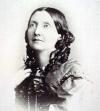Louisa Anne Meredith poet from United Kingdom was born on July 20, 1812, had 83 years and died on October 21, 1895. Poems were written mainly in English language. Dominant movement is other.
Biography
Louisa Anne Meredith also known as Louisa Anne Twamley, was an Anglo/Australian writer and illustrator.[1]
Louisa Anne Twamley was born in Birmingham, England, the daughter of Thomas Twamley and Louisa Ann née Meredith.[1] She was educated mainly by her mother, and in 1835 published a volume, Poems, which was reviewed favourably. This was followed by The Romance of Nature (1836, third edition 1839), mostly in verse. Another volume was published in 1839,[2] subtitled An autumn ramble on the Wye an account of a tour on the River Wye from Chepstow to near its source at Plynlimon.[3]
On 18 April 1839 Louisa married her cousin, Charles Meredith at Old Edgbaston Church, Birmingham.[1] Charles had emigrated to Van Diemen's Land (now Tasmania) in 1821 with his father George and family. They had been pioneers of grazing, whaling and other activities around Swansea on Tasmania's East Coast. Charles had become a squatter in the Canberra district of New South Wales.
Louisa and Charles Meredith sailed for New South Wales in June 1839, and arrived at Sydney on 27 September 1839. After travelling into the interior as far as Bathurst, Mrs Meredith returned to the coast and lived at Homebush for around a year.[3] By the time of his return to New South Wales, severe economic depression caused by excessive land speculation had destroyed the value of Charles' property, and towards the end of 1840 they relocated to Tasmania. An interesting account of her first 11 years in Australia is given in her two books, Notes and Sketches of New South Wales (1844), reprinted at least twice, and My Home in Tasmania (1852), which was soon republished in the United States of America under the title Nine Years in Australia.
For most of her life Louisa Meredith lived on properties around Swansea. In 1860 she published Some of My Bush Friends in Tasmania which contained elaborate full-colour plates printed by the new chromolithography process. The illustrations were drawn by herself, and simple descriptions of characteristic native flowers were given. In 1861 an account of a visit to Victoria in 1856, Over the Straits, was published, and in 1880 Tasmanian Friends and Foes, Feathered, Furred and Finned. This went into a second edition in 1881. In 1891, Meredith went to London to supervise the publication of Last Series, Bush Friends in Tasmania. Published at the beginning of a severe financial depression in the Australian colonies, this project and the collapse of the bank where most of her savings were held ruined her financially. In her final years Louisa suffered from chronic sciatica and became blind in one eye. She died in Collingwood, Victoria (a suburb of Melbourne) on 21 October 1895[1] and was survived by sons Owen and George.[3]
Meredith was the author of two novels, Phoebe's Mother (1869), which had appeared in the Melbourne weekly The Australasian in 1866 under the title of Ebba, and Nellie, or Seeking Goodly Pearls (1882).
Meredith took great interest in politics, her husband Charles being a Member of the Tasmanian Legislative Council for several terms between the mid-1850s until just before his death in 1881. She was an early member of the Society for the Prevention of Cruelty to Animals and influenced her husband to legislate for preservation of native wildlife and scenery.[3]
Meredith often wrote unsigned articles for the Tasmanian press. This was no new thing for her as in her youth she had written articles in support of the Chartists. When she visited Sydney in 1882, Sir Henry Parkes told her that he had read and appreciated her articles when a youth. After her husband's death she was granted a pension of £100 a year by the Tasmanian government. Many of her books were illustrated by herself. Her volumes on New South Wales, Tasmania, and Victoria in the 1840s and 1850s, will always retain their historical significance.[3]






